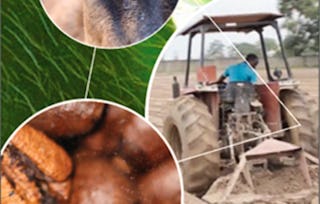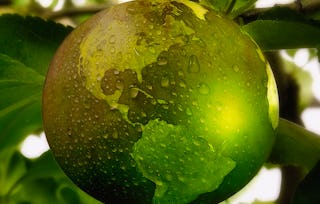Our society depends on the availability of food and accessibility to it. According to the United Nations nearly 800 million people are hungry and on the other hand, over 650 million people are obese. While many people in developing countries experience food shortage, in industrialized countries people are throwing food away.
Unravelling solutions for Future Food problems

Unravelling solutions for Future Food problems



Instructors: Prof. dr. Denise de Ridder
17,276 already enrolled
155 reviews
Skills you'll gain
Details to know
See how employees at top companies are mastering in-demand skills

There are 5 modules in this course
What's included
4 videos3 readings1 assignment1 peer review
What's included
4 videos2 readings2 assignments1 peer review1 discussion prompt
What's included
6 videos4 readings3 assignments
What's included
7 videos2 readings1 assignment3 peer reviews1 discussion prompt
What's included
1 video1 reading1 peer review
Instructors


Offered by
Explore more from Public Health
 Status: Preview
Status: PreviewUniversity of Copenhagen
 Status: Free Trial
Status: Free TrialUniversity of Illinois Urbana-Champaign
 Status: Free Trial
Status: Free TrialStanford University
 Status: Preview
Status: PreviewUniversity of Pennsylvania
Why people choose Coursera for their career

Felipe M.

Jennifer J.

Larry W.

Chaitanya A.
Learner reviews
- 5 stars
74.19%
- 4 stars
19.35%
- 3 stars
4.51%
- 2 stars
1.29%
- 1 star
0.64%
Showing 3 of 155
Reviewed on Sep 14, 2025
Excellent course, this course helps to gain knowledge
Reviewed on Jun 25, 2019
Exceptional everybody. Fantastic course but more than anything absolutely inspirational. This course helped me find my direction for future studies. I truly am very grateful.
Reviewed on Oct 28, 2018
problem solving course. related to 2nd program of united nation (zero hunger)

Open new doors with Coursera Plus
Unlimited access to 10,000+ world-class courses, hands-on projects, and job-ready certificate programs - all included in your subscription
Advance your career with an online degree
Earn a degree from world-class universities - 100% online
Join over 3,400 global companies that choose Coursera for Business
Upskill your employees to excel in the digital economy
Frequently asked questions
To access the course materials, assignments and to earn a Certificate, you will need to purchase the Certificate experience when you enroll in a course. You can try a Free Trial instead, or apply for Financial Aid. The course may offer 'Full Course, No Certificate' instead. This option lets you see all course materials, submit required assessments, and get a final grade. This also means that you will not be able to purchase a Certificate experience.
More questions
Financial aid available,
¹ Some assignments in this course are AI-graded. For these assignments, your data will be used in accordance with Coursera's Privacy Notice.